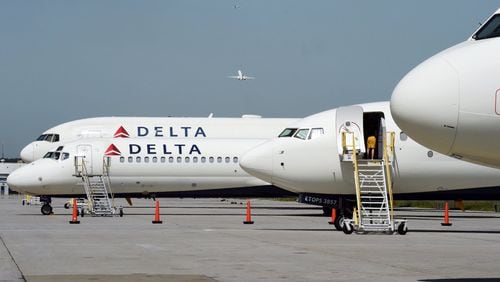Senate Republicans dropped language from their tax overhaul late Friday targeting airline carriers in the Persian Gulf, a major blow to Delta Air Lines on one of its top D.C. policy priorities.
An amendment U.S. Sen. Johnny Isakson, R-Ga., had added to the bill last month codifying Atlanta-based Delta's wishes was not included in the final text of the measure passed by the Senate on a 51-49 party-line vote early Saturday morning.
The language's exclusion came amid a flurry of last-minute changes made to the bill in order to win the votes of a handful of wavering Republicans. Other provisions were struck due to parliamentary reasons, since the GOP was looking to avoid a Democratic filibuster and hence was required to adhere to a strict Senate budget rule.
The Isakson amendment was divisive in some corners of the travel industry but drew support not only from Delta but its two major U.S. competitors, United and American Airlines. Another metro Atlanta-based corporation, shipping giant UPS, advocated for its removal because it was concerned Middle Eastern governments could retaliate politically and harm their operations there.
Isakson’s amendment would have cracked down on income tax exemptions provided to some of Delta, American and United’s international competitors — primarily the Qatar and United Arab Emirates-based Etihad, Emirates and Qatar Airways.
The U.S. airlines argue the Gulf carriers have an unfair advantage over them — particularly in the booming Middle Eastern and Asian markets — because they receive generous subsidies from their oil-rich governments. They said those financial benefits undercut the international aviation pacts between the U.S. and those Middle Eastern nations, which essentially function as free trade agreements.
“Foreign airlines should not receive preferential tax treatment if their countries choose not to open their markets to U.S. companies,” Isakson said last month. The Republican senator said the provision would have helped “protect Georgia airline employees.”
But some outside groups warned about unintended political consequences of the language should it be codified into law.
The Sandy Springs-based UPS, which operates in the Gulf, said it was supportive of the tax overhaul more broadly but that the Isakson language was "problematic" given the "likely retaliatory impact on the cargo industry in the overseas markets we serve," according to spokeswoman Kara Ross. FedEx had come out against the campaign by U.S. airlines in the past, saying it reeked of trade protectionism.
Representatives from the Gulf airlines, meanwhile, have argued that U.S. carriers also receive government subsidies and that their American counterparts were trying to bully their way out of an economic fight they were losing.
“What I’m trying to do is get everybody to the table so that our companies ... are all competing on a level playing field. We’ve appropriately gotten everyone’s attention, so we’ll move forward to get everyone negotiating,” Isakson said in an interview Thursday.
Regarding cargo carriers such as UPS and FedEx, Isakson said, “they have an interest too so I want to watch out for them as well.”
The Partnership for Open & Fair Skies, a group set up by the U.S. airlines to fight the Persian Gulf carriers, declined to comment.
Congressional scorekeepers previously estimated the Isakson amendment would have led to some $200 million in new revenue for the federal government because of the taxes the Gulf carriers would have been forced to pay.
The U.S. carriers had been pushing the Obama and Trump administrations to similarly punish their Gulf-based rivals for more than two years.








